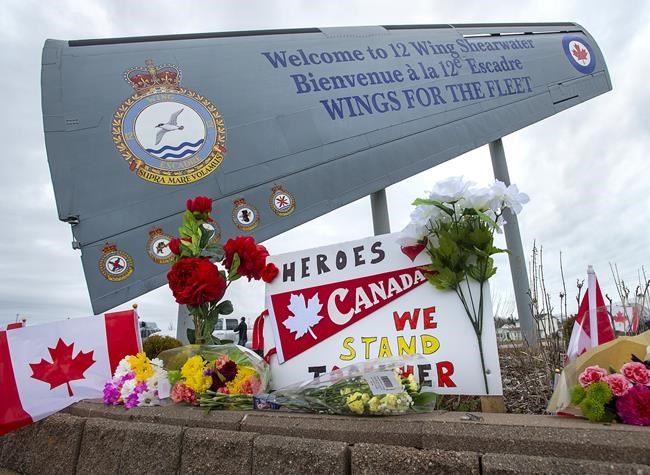Military has located wreckage of helicopter and remains in Mediterranean

OTTAWA - The Canadian Armed Forces has located the remains of some of the military members who died last month when the helicopter they were in crashed in the Mediterranean.
A Canadian search and recovery team working with the United States Navy discovered the remains early Wednesday morning, not far from where they also located a large piece of the helicopter's fuselage, the military said in a written statement.
"This is encouraging news," said Lt.-Gen. Mike Rouleau, the commander of Canadian Joint Operations Command.
"We do not leave our fallen behind, and recovering Stalker 22's crew is of the utmost importance to all of us in the Canadian Armed Forces and the Department of National Defence."
The CH-148 Cyclone helicopter, known as Stalker 22, crashed in the Ionian Sea April 29, killing four members of the air force and two from the navy. The helicopter was returning to HMCS Fredericton after a training flight and crashed within full view of the ship, which was in the Mediterranean participating in a NATO mission.
The body of Sub-Lt. Abbigail Cowbrough was recovered immediately after the crash and remains of Capt. Brenden Ian MacDonald were recovered almost two weeks later. Four other service members are still listed as missing and presumed dead, including Capt. Kevin Hagen, Capt. Maxime Miron-Morin, Sub-Lt. Matthew Pyke, and Master Cpl. Matthew Cousins.
Their families were informed that bodies had been located Wednesday, before the military went public with the news.
The crash occurred in deep water about 400 kilometres east of Catania, Sicily. The Canadian military requested help from the U.S. Navy because Canada does not have capability to search in water that deep.
The search teams left Greece on a supply ship May 25 and arrived on the crash site early Wednesday morning. They deployed a remotely operated sub, which the military said quickly found a large piece of the fuselage at a depth of 3,143 metres. Remains of the fallen military personnel were found nearby.
The flight data and voice recorders were retrieved the day of the crash and are being analyzed in Ottawa, but Rouleau said recovering the actual helicopter will help determine what caused the crash.
The military said more information about the search and recovery effort will be made public in the coming days. The remaining members of the Cyclone detachment have returned to Canada. HMCS Fredericton was docked in Italy for almost two weeks following the crash but returned to service May 13.
Rear-Admiral Craig Baines, the commander of Maritime Forces Atlantic, said the search operation is very complicated and may take a long time to complete.
The Canadian Armed Forces said the recovery team will continue the search for as long as necessary.
This report by The Canadian Press was first published May 27, 2020.